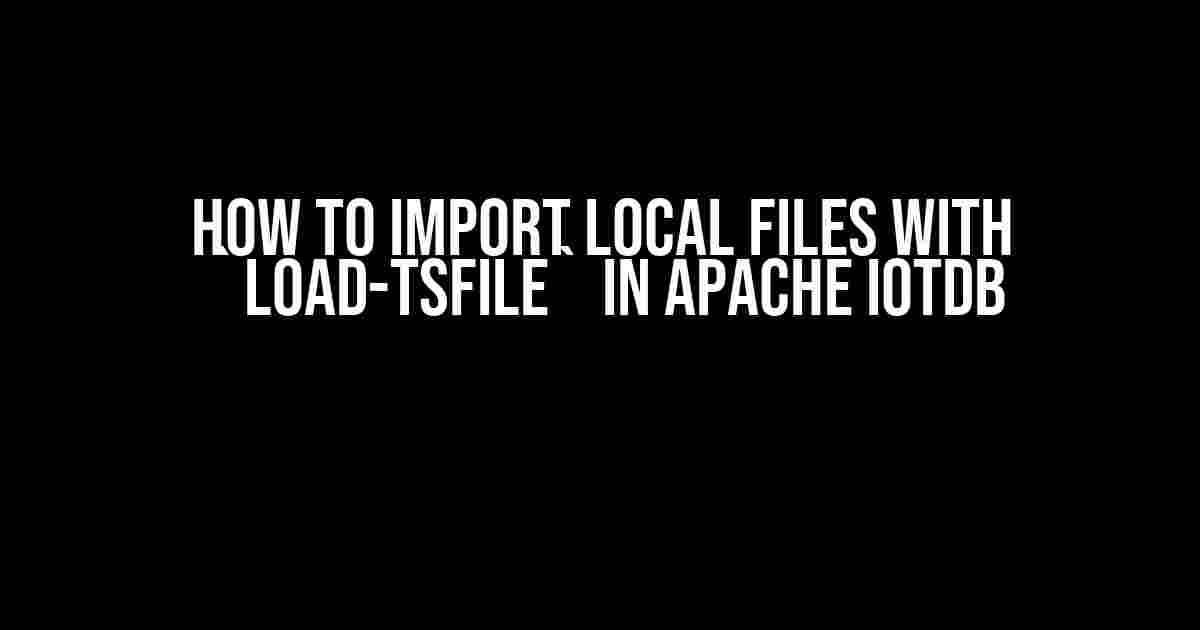Apache IoTDB is a popular IoT data management platform that allows users to efficiently store and process large amounts of time-series data. One of the essential features of IoTDB is the ability to import local files using the `load-tsfile` command. In this article, we will explore how to import local files with `load-tsfile` in Apache IoTDB.
Prerequisites
Before we dive into the steps, make sure you have:
- Apache IoTDB installed and running on your system.
- A local file in the correct format (e.g., CSV, JSON) containing the time-series data you want to import.
Step 1: Prepare Your Local File
Ensure your local file is in the correct format and has the necessary columns for IoTDB to recognize. Typically, the file should have the following columns:
- timestamp (in milliseconds)
- device_id (string)
- sensor_id (string)
- value (double)
Step 2: Use the `load-tsfile` Command
Open your terminal or command prompt and navigate to the directory where your local file is located. Run the following command to import the file:
load-tsfile -tsfile your_file.csv -hostname 127.0.0.1 -port 6667 -username root -password root -database rootReplace `your_file.csv` with the name of your local file, and adjust the hostname, port, username, password, and database accordingly.
Step 3: Verify the Imported Data
After running the `load-tsfile` command, verify that the data has been successfully imported by querying the IoTDB database. Use the IoTDB Cli tool or a SQL client to execute a query, such as:
SHOW TIMESERIESThis will display a list of all time-series data in your database, including the data you just imported.
Conclusion
In this article, we have demonstrated how to import local files with `load-tsfile` in Apache IoTDB. By following these steps, you can easily load your time-series data into IoTDB for storage, processing, and analysis. If you encounter any issues or have further questions, refer to the official Apache IoTDB documentation or seek help from the community.
Frequently Asked Question
Got stuck while importing local files with `load-tsfile` in Apache IoTDB? Don’t worry, we’ve got you covered! Here are some frequently asked questions and answers to help you out.
Q1: What is the basic syntax to import a local file using `load-tsfile` in Apache IoTDB?
The basic syntax is `LOAD TIMESERIES FILE ‘file_path’ INTO ‘device’ WITH (format=’csv’, encoding=’utf-8′)`. Replace `file_path` with the path to your local file and `device` with the name of your IoT device.
Q2: Can I import a file from a specific directory using `load-tsfile` in Apache IoTDB?
Yes, you can! Just specify the full path to the file, including the directory, in the `LOAD TIMESERIES FILE` statement. For example, `LOAD TIMESERIES FILE ‘/path/to/your/file.csv’ INTO ‘device’ WITH (format=’csv’, encoding=’utf-8′)`.
Q3: What file formats are supported by `load-tsfile` in Apache IoTDB?
Apache IoTDB supports various file formats, including CSV, JSON, and AVRO. You can specify the file format using the `format` option in the `LOAD TIMESERIES FILE` statement.
Q4: How can I handle errors during file import using `load-tsfile` in Apache IoTDB?
You can use the `on_error` option to specify how to handle errors during file import. For example, you can set `on_error` to `CONTINUE` to ignore errors and continue importing the file, or set it to `ABORT` to stop importing the file when an error occurs.
Q5: Is there a limit to the file size that can be imported using `load-tsfile` in Apache IoTDB?
While there is no hard limit to the file size, large files can cause performance issues. It’s recommended to split large files into smaller chunks and import them separately. You can also adjust the `batch_size` option to control the number of rows imported in each batch.

